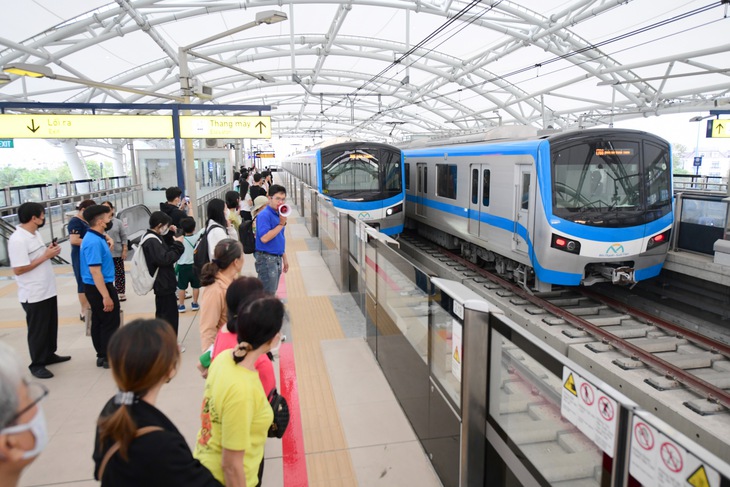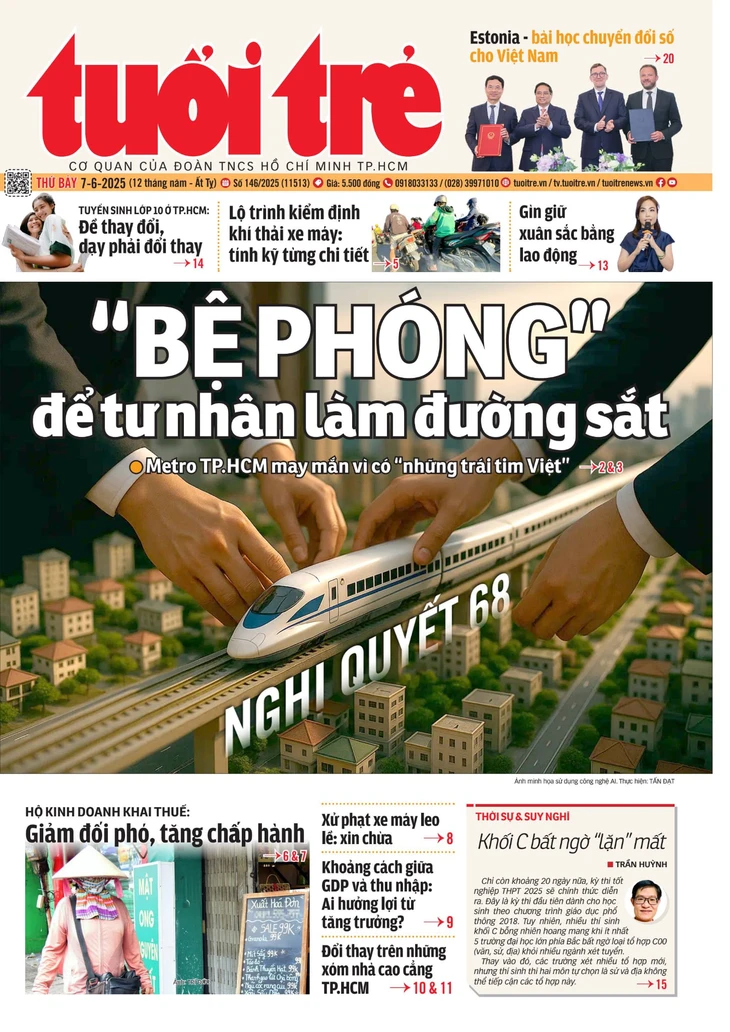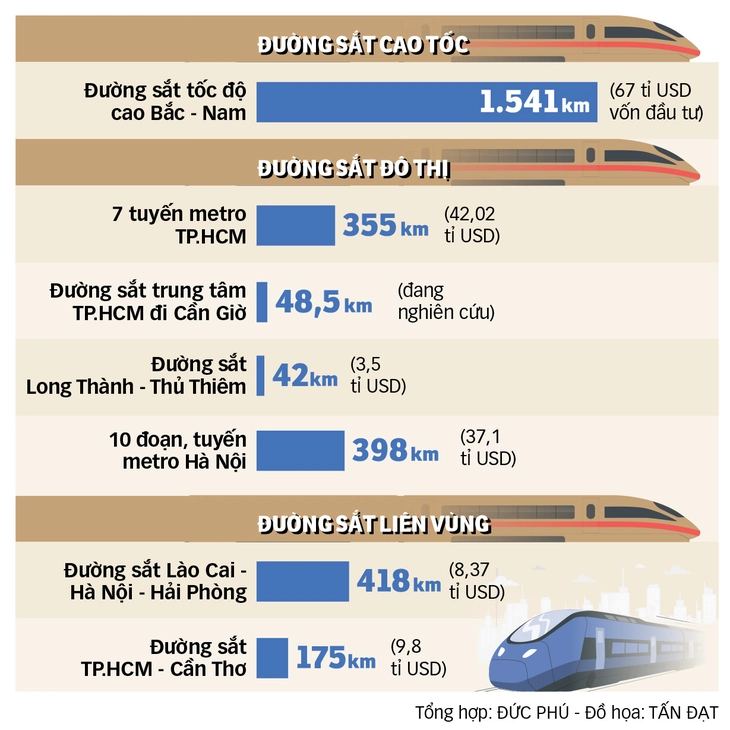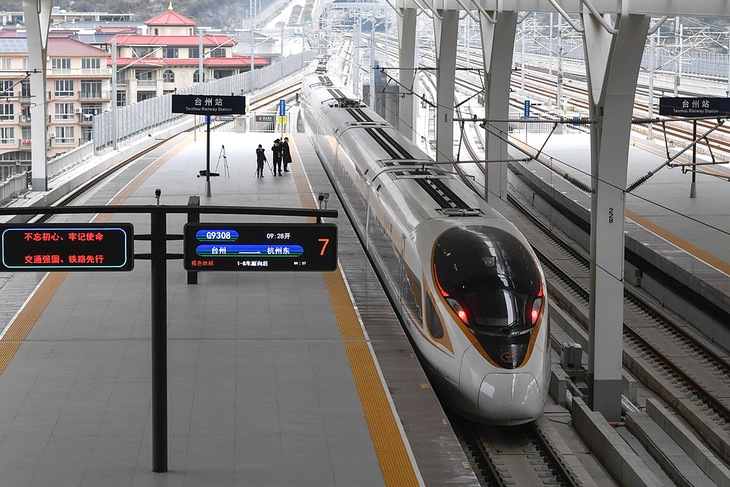Illustrative image created using AI technology - By: TAN DAT
According to experts, if given the right roles, private corporations and enterprises can absolutely create miracles in the railway sector similar to what they have achieved in urban development, automobiles, energy, and so on.
Choose a company with sufficient resources and entrust the entire project to them.
The open-minded approach to entrusting large-scale projects, including the North-South high-speed railway, was emphasized by Prime Minister Pham Minh Chinh at a roundtable discussion with the business community on May 31st, aimed at effectively implementing Resolution 68 of the Politburo on the development of the private economy.
The Prime Minister emphasized the need for a clear distinction between the conditions and standards for investors and the conditions and standards for contractors.
Investors only need to have sufficient financial resources to invest in any field that is profitable and effective, so experience is not necessary.
"It's possible to stipulate that casino investors must have $2 billion to invest in casinos in Vietnam, but don't demand that they have experience in this field. They can organize their business, hire experienced contractors, and hire managers – that's their business. This is precisely the bottleneck in administrative procedures that needs to be resolved," the Prime Minister stated.
Associate Professor Tran Dinh Thien, a member of the Prime Minister's Policy Advisory Council, said that the Prime Minister has clearly stated his views on how to implement a large-scale, modern project differently from before. For a long time, project contracts did not clearly differentiate, simply specifying the required number of years of experience... leading to difficulties in implementation, sometimes requiring multiple contractors for the same task.
"We must change our approach. For large projects, we must organize them by assigning a single enterprise as the investor throughout the entire process. The assigned investor must have proven and reliable financial and management capabilities. The investor's task is to assemble skilled contractors and consultants and manage the project implementation in the best possible way," said Associate Professor Dr. Tran Dinh Thien.
We need to change our approach. For large projects like the North-South railway, a single enterprise should be entrusted with the role of the investor throughout the entire process. This investor must possess proven and reliable financial and management capabilities. The investor's responsibility is to assemble a team of skilled contractors and consultants and execute the project in the best possible way.
Assoc. Prof. Dr. Tran Dinh Thien
It was possible to "choose wisely who to entrust the task to".
According to experts, Resolution 68 of the Politburo, Resolution 198 of the National Assembly, and the Government's Action Program all clearly demonstrate a consistent viewpoint: placing trust in the private sector. This has opened up new opportunities for private enterprises to participate in key sectors, including high-speed rail.
The fact that domestic businesses registered to participate in the North-South high-speed railway project clearly demonstrates one thing: when opportunities arise, domestic enterprises immediately show a proactive spirit and the capacity to respond.
This is a positive sign because it creates healthy competition and demonstrates that there are capable businesses willing to undertake large-scale projects when the country needs them.
Associate Professor Tran Dinh Thien believes that many private enterprises have made strong breakthroughs, demonstrating their ability to succeed in many aspects: finance, management, and technology; from automobile manufacturing and high technology to tunnel construction, land reclamation, and smart city development... Notably, they are not only contractors, but also assume the role of investors, managers, and leaders of the entire project.
"We must place trust in, give opportunities to, and strongly support domestic businesses to gradually form corporations capable of competing globally. This is not just about implementing a few large projects, but also about changing management thinking, shifting to a new development model in which the State plays a facilitating, supervisory, and ensuring role in maximizing the efficiency of all resources," said Associate Professor Dr. Tran Dinh Thien.
Mr. Thien also noted that entrusting businesses does not mean "complete delegation" or allowing cronyism to dominate. The selection of businesses must be based on principles of transparency, genuine capabilities, and project effectiveness as the ultimate goal. It must ensure that the best people are chosen, possessing sufficient management skills and responsibility to complete the task.
People have gradually become accustomed to using the Ben Thanh - Suoi Tien metro line - Photo: QUANG DINH
Private investment: a "life-or-death decision"
Front page of Tuoi Tre daily newspaper, June 7th.
Associate Professor Bui Tat Thang (former director of the Institute for Development Strategy - Ministry of Planning and Investment, chairman of the Vietnam-ASEAN Economic Cooperation Development Association) said that the decisive directives and strategic and correct orientations in the current period aim to remove difficulties and obstacles, creating momentum to promote the development of the private sector as a pillar of the economy.
Mr. Thang also recalled that when Governor-General Paul Doumer visited Indochina, he was followed by several private enterprises. It was these enterprises that built the large-scale railway and road systems in Indochina. Historically, Europe's development was due to the shareholding system, not state budgets. This shows that the private sector can absolutely play a pioneering role in building transportation infrastructure, if the right mechanisms are in place.
Private sector involvement is essential to ending the lack of competition that persists in some sectors today. However, the crucial issue is selecting the right investors and ensuring they fulfill their commitments.
"To achieve this, we must establish contractual mechanisms based on international standards between the State and private enterprises. If we can select a capable private investor this time and successfully implement the railway project, it will be a major breakthrough, not only in practice but also in terms of awareness. Personally, I expect and eagerly await the success of this breakthrough," Mr. Thang affirmed.
According to Dr. Pham Viet Thuan, Director of the Institute of Resource and Environmental Economics in Ho Chi Minh City, new policies and mechanisms being developed and perfected will pave the way for the development of high-speed rail and urban rail in Vietnam. In particular, attracting private investment into key national projects, as stipulated in Resolution 68, is considered a vital policy in the era of deep economic integration.
The large number of national railway projects and urban railway lines requires significant capital, therefore mobilizing private resources is essential to reduce the burden on the state budget.
The Politburo's resolution also affirmed the important role of private enterprises in accompanying the State in developing urban railways, and stated that only private sector participation can solve key national projects. This is an open and strategic mindset for Vietnam's economic development in the 2025-2035 period.
"With private investment, the State only needs to focus on managing the policy and progress, without directly constructing or operating. We must boldly entrust the projects to the private sector to do them quickly and early, without hesitation or excessive worry. If we hesitate, the projects will continue to be delayed, and the dream of a modern transportation network will remain forever out of reach," Mr. Thuan emphasized.
Resolution 68: Private sector to undertake nationally important projects.
Resolution 68 of the Politburo on the development of the private economy clearly outlines the tasks and solutions for the rapid formation and development of large and medium-sized enterprises, and private economic groups of regional and global stature.
This includes the requirement to expand the participation of private enterprises in nationally important projects; the State should proactively implement policies for ordering, limited bidding, or direct contracting, or provide incentives to encourage the private sector to participate alongside the State in strategic areas, key national projects, and important scientific research tasks (such as high-speed rail, urban rail, cutting-edge industries, energy infrastructure, digital infrastructure, green transportation, defense and security industries...), as well as urgent and critical tasks.
There are solutions to encourage private businesses to invest in expanding and developing high-quality healthcare and education services, as well as developing the cultural and entertainment industries.
* National Assembly Representative PHAM VAN HOA (Dong Thap):
The automotive industry is a prime example.
Prime Minister Pham Minh Chinh's policy that investors with sufficient financial resources and profitability can invest in any sector is very appropriate for opening the door for capable private corporations and enterprises to participate in the investment and construction of key projects, including the North-South high-speed railway project.
Instead of focusing too much on "experience in railway construction," we should concentrate on the decisive criteria: financial capacity, project management capabilities, ability to mobilize domestic and international resources, and commitment to timely and quality implementation.
In reality, there are corporations with strong economic potential and high determination that have successfully implemented projects and tasks that no one else in the country, or even within the country, has ever undertaken before. This is a prime example of the Prime Minister's statement. Because when investors have strong economic potential and good management capabilities, they will be able to choose good contractors to carry out the projects.
A prime example of this is the automotive industry, where Vingroup Corporation has achieved success with its VinFast brand. From having never manufactured cars before, VinFast has now dominated the domestic market, pioneered the transition to electric vehicles with advanced technology, and expanded its exports to many countries.
This reality shows that with transparent and equitable policies, we can be confident that the private sector can play a larger role in key national projects. This is the time for the State to trust in the internal strength of Vietnamese businesses, while effectively promoting public-private partnerships for the goal of sustainable national development.
Many countries invite private companies to develop infrastructure.
With limited public budgets and increasing infrastructure development needs, many countries are proactively encouraging private sector participation in key projects – particularly in the railway and transportation sectors.
Instead of just making general appeals, many governments are gradually adjusting legal policies, financial mechanisms, and risk allocation to create a more favorable environment for private businesses to participate.
* In the US: The Brightline railroad in Florida is a notable example of the ability to mobilize private resources. Although entirely privately owned and operated, the Brightline high-speed railroad is primarily notable for its flexible investment approach, such as reusing existing infrastructure while leveraging financial instruments like tax-exempt bonds to reduce capital costs and shorten implementation time.
According to City Journal on January 29th, although the project has not yet achieved short-term financial viability, its rapid implementation and continuous expansion demonstrate the growing role of the private sector in complex infrastructure projects. Instead of relying solely on public funding, this model shows the potential for effectively supplementing social resources in the development of key transportation infrastructure.
* In China: The first privately owned high-speed railway line, named Hangzhou-Shaoxing-Taizhou, connecting three cities in Zhejiang province—Hangzhou, Shaoxing, and Taizhou—with Fuxing Group playing a leading role in investment (51%), marks an institutional turning point.
According to China.com, the Zhejiang provincial government has implemented a policy to support projects equivalent to public projects, where a private enterprise is responsible for investing in, operating, and bearing the financial risks of the route.
As a result, after more than 1,400 days of construction across challenging terrain, the route became operational on schedule, serving nearly 40 million passengers in its first two years and making a significant contribution to the region's GDP.
* In India: The government is testing a hybrid recurring payment (HAM) model to attract private investment in the Mumbai-Ahmedabad high-speed rail project, which is over 500km long.
With support from international businesses and modern signaling technology, India is not only aiming for transport growth but also for urban development, emission reduction, and improved living standards in surrounding areas, according to Metro Rail Daily on May 12.
International experience shows that attracting private sector investment in key transportation projects is a consistent strategy for many countries to effectively mobilize social resources for infrastructure development.
Besides encouraging investment, countries are also improving the legal framework, stabilizing support mechanisms, and ensuring a fair allocation of risks, creating conditions for private enterprises to confidently invest long-term and make substantial contributions to national infrastructure development goals.
DUC PHU - TIEN LONG - LIEN AN
Tuoitre.vn
Source: https://tuoitre.vn/be-phong-de-tu-nhan-lam-duong-sat-20250607082241141.htm








![[Photo] General Secretary To Lam working with the Central Inspection Committee](https://vphoto.vietnam.vn/thumb/1200x675/vietnam/resource/IMAGE/2026/03/05/1772718314670_a1-bnd-8682-5192-jpg.webp)



![[Photo] Prime Minister Pham Minh Chinh receives the Minister of Emergency Situations of the Russian Federation.](https://vphoto.vietnam.vn/thumb/1200x675/vietnam/resource/IMAGE/2026/03/05/1772712011395_ndo_br_thiet-ke-chua-co-ten-76-png.webp)



































































































Comment (0)